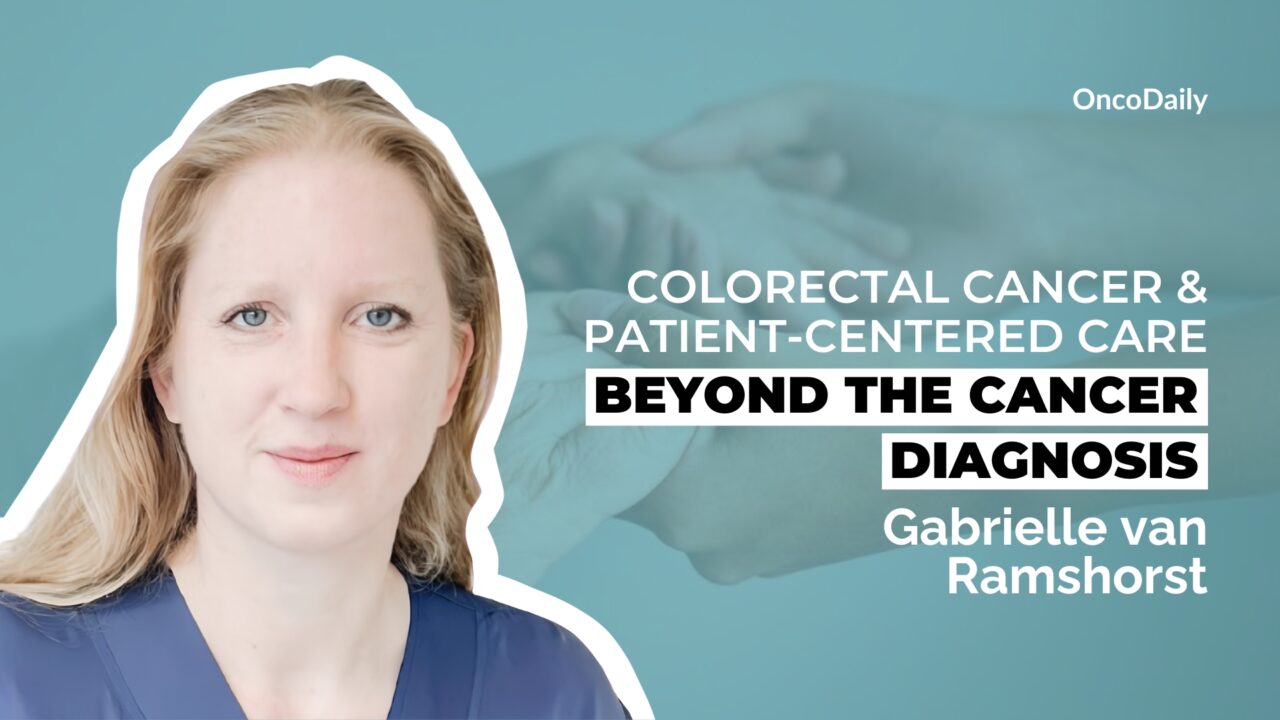In the latest episode of ‘Beyond the Cancer Diagnosis’, Adrian Pogacian debates a pressing topic: Rethinking fertility in colorectal cancer from a psycho-oncological perspective, together with Gabrielle van Ramshorst, Consultant colorectal surgeon at Ghent University Hospital and Associate Professor at Ghent University in Belgium.
Gabrielle van Ramshorst is a Consultant colorectal surgeon at Ghent University Hospital and Associate Professor at Ghent University in Belgium. She studied at Leiden University in the Netherlands and spent part of her training in Sweden, Ghana and in Surinam. After obtaining her PhD degree, she undertook surgical training at Amsterdam UMC.
During her fellowship – funded by the Dutch Cancer Society – she was trained in colorectal surgery, gynecological oncology and urologic oncology at the Netherlands Cancer Institute, Amsterdam UMC and at the Royal Prince Alfred Hospital in Sydney, Australia. She passed European exams for colorectal surgery (ESBQ), gynaecological oncology (ESGO) and for sexual medicine (ESSM).
In 2019, Prof. Dr. van Ramshorst worked as a surgeon at the Glasgow Royal Infirmary Hospital in Scotland before she started working at Ghent University Hospital. Her clinical areas of interest include pelvic exenteration surgery, primary and recurrent colorectal cancer, gynecological oncology, and sarcoma surgery.
She leads several projects on abdominal wound closure and surgical site infection prevention as a member of the research committee and cohort studies committee of the European Society for Coloproctology (ESCP). She is the lead for ESCP’s Diversity Working Group, the current vice-chair for the International Committee of the Society for Surgical Oncology (SSO) and a member of the Education Committee of the European Network for Young Gynaecological Oncologists (ENYGO).
Adrian Pogacian, MS Psychology, clinical psychologist with executive education in Psycho-oncology, holding a degree in Global Health Diplomacy from Geneva Graduate Institute. Currently, researcher and associate lecturer with focus on Impact of Cancer Diagnosis on Couples and Families, Communication in Cancer Care and Posttraumatic Growth. His expertise is on Coping with Cancer and managing Fear of Recurrence.
Additionally, Founder of INCKA Psycho-oncology Center, Host of Beyond the Cancer Diagnosis Interview Series as well as Writer and Host Content in Psycho-oncology at OncoDaily.com, co-author of the first Romanian Multimodal Care Guideline in Pediatric Onco-hematology, active contributor to the International Psycho-oncology Society, presently IPOS Fear of Cancer Recurrence SIG member and IPOS Early Career Professionals in Psycho-Oncology Committee founder member.
Gabrielle explains that colorectal cancer is the fourth most common type of cancer, with over a million people diagnosed annually. Notably, there has been an increase in colorectal cancer diagnoses in individuals under 50, and this is becoming more prevalent in developing countries as well. As a result, fertility concerns are becoming an important aspect of cancer treatment, particularly for younger patients.
Gabrielle elaborates on the treatment process for colorectal cancer, emphasizing that surgery is the primary treatment, often followed by chemotherapy if the cancer has spread to the lymph nodes. Chemotherapy can induce side effects such as amenorrhea (absence of menstruation) in women and fertility issues in both men and women. For rectal cancer, treatment now often includes chemotherapy and radiotherapy before surgery, which introduces additional complications like potential infertility and sexual dysfunction.
The treatment can also result in a stoma (an opening for waste removal), which can significantly affect body image and relationships, adding emotional and social burdens on patients and their partners.
The conversation then shifts to the impact of colorectal cancer on fertility. Gabrielle explains that many young patients, particularly those under 30, may not be prepared for the possibility of infertility due to cancer treatment. Fertility is often not discussed adequately before treatment begins, which can lead to feelings of sadness, frustration, and a loss of control after treatment if patients find out they are infertile.
She highlights the emotional strain, especially when young patients experience early menopause and associated symptoms such as weight gain, thinning hair, and joint pain, which are not considered age-appropriate. There is also a social stigma surrounding these changes, leading to feelings of isolation.
Moreover, the social dynamics around cancer treatment often prioritize survival over other concerns, like fertility, leaving these issues secondary. This mindset can result in young cancer patients feeling unsupported in dealing with the long-term effects of their treatments. Gabrielle stresses the importance of providing proper counseling about fertility options before starting chemotherapy or radiotherapy, as once the treatment is underway, it may be too late to preserve fertility.
The discussion continues to touch on the psychological impact of infertility, especially for those who had not previously considered having children. It also notes the gender differences in how patients respond to fertility issues.
For women, there may be feelings of guilt and inadequacy if they cannot provide their partner with children. Men, on the other hand, may avoid discussing their emotional and sexual health, often leaving their partner to navigate these challenges alone. Gabrielle points out that in many cases, women have a stronger need to communicate their feelings, particularly related to fertility and sexual health, while men might struggle to engage in these sensitive conversations.


